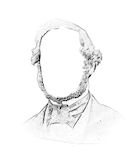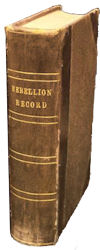 Rienzi, Tishomingo Co., Miss., June 9, 1862.
Rienzi, Tishomingo Co., Miss., June 9, 1862.
Saturday morning the 5th inst. the colonel and myself started for a little pleasure ride as a relaxation from the many cares and troubles people in this profession are incident to. We started for Corinth, as neither of us had yet visited the place, and plodded along through dust in air and heat—words can’t tell how oppressive. We stopped at General Rosecrans about 1 p.m. and stayed and dined with him. The general was in his most pleasant mood and I thought him very engaging and winning in his manner. He told a number of amusing stories and ’twas all very pleasant, until somebody happened to mention General Fremont’s name. General Granger was also at the table and the two generals commenced and each tried to outdo the other in—yes, reviling the “bumble-bee catcher.”
They changed the subject over the wine and General Rosecrans became quite enthusiastic and prophetic in his conviction in regard to the war question, settlement thereof, etc. But I couldn’t see any remarkable difference between him and the rest of mankind, and the same remark will apply to all that I know of the other generals here. I remember he said that he considered “slavery a vile blot on the face of the earth,” and that unadulterated abolitionism alone was its equal; but I don’t claim that the speech showed any remarkable talent. We left him swearing at his A. Q. M. and journeyed on. We luckily met an old acquaintance of the colonel’s, a captain in the 1st Regular Infantry, and went with him to his quarters for the night. All the regimental officers quartered together in a very fine house that belongs to a secesh colonel. They were a jolly set of men, and the empty bottles lying around loose when we retired testified strongly thereto. I remember seeing one of them at Point Pleasant, Mo., have a couple of little fights (he commanded a two-gun battery of siege pieces) with a Rebel battery on the opposite shore.
We left Corinth early next morning for Farmington, and as we passed I saw where Major Applington fell. It was as I supposed about one-half mile from Corinth (hardly that) and what I did not know, was within 400 yards of the strongest part of the Rebel fortifications. We lunched at 10 a.m. and paid an old lady the modest sum of 50 cents for a piece of cornbread and a glass of buttermilk. She complained bitterly of some of Buell’s soldiers killing three of her chickens without paying for them, and just the day before her husband had been to Corinth and received meat, flour, etc., free from the aid society. She had three sons in the Southern Army. At 12 m. we drew rein 25 miles from Corinth at Iuka.
There are a couple of splendid springs in Iuka. One chalybeate, and the other sulphur water, and the town is the neatest I have seen in the country. Snuff-dipping is an universal custom here, and there are only two women in all Iuka that do not practice it. At tea parties, after they have supped, the sticks and snuff are passed round and the dipping commences. Sometimes girls ask their beaux to take a dip with them during a spark. I asked one if it didn’t interfere with the old-fashioned habit of kissing. She assured me that it did not in the least, and I marveled. There was only one regiment at Iuka, and they were expecting an attack from the hordes of guerrillas that infest the country all along our front from Memphis to Florence. I stayed at the hotel in town and had just retired (about 11) when crack, crack, two guns went, only about 60 rods from the house. There was a general shaking of the whole building, caused by the sleepers rising en masse and bouncing out on the floors. I thought if there was no fight I wouldn’t be fooled, and if there was I couldn’t do any good, so I kept cool. ‘Twas only a little bushwhacking. A soldier policeman having been shot at from the brush, and he returned the favor by guess. This infantry always thinks the enemy is just out of gunshot of them, and they are three-fourths scared to death all the time. At noon of Monday we left Iuka, rode to Burnsville, a place that I have spoken of in my letters before, as we scouted through it while lying before Corinth. None of our soldiers have camped there yet, and we were the only ones there while we stayed. The colonel took a nap to recover from the heat and fatigue of riding, and I strolled down town to look up some acquaintances I made while scouting. They treated me pretty well, and made me a letter carrier, as many of them had letters to send to their friends who are prisoners. At dark we started for Jacinto, ten miles south, but for so many hills had a splendid ride. ‘Twas through the woods, all the way, and over real young mountains. We got to Jacinto at 10 p.m. and concluded to stay all night. I laid down an hour or two, but the fleas were so bad that I got up and stayed up the rest of the night. I walked around the town and stopped at headquarters of the guard and talked with the boys. (They were of Jeff C. Davis’s division, of Pea Ridge, Ark., and Siegel.) They all think that Siegel is the only man and hate Davis like the devil. I waked the colonel at 4 p.m. and we started for home. The road from Jacinto, home, was lined with infantry, the whole left wing of our corps being on it. They had no tents but seemed to be preparing the ground for a camp. We got home in time for a little nap before breakfast, both of which I enjoyed very much. We found the garrison much excited about an attack that was expected every hour. The 2d Brigade of Cavalry had been about eight miles in front doing outpost duty, and having been alarmed by rumors had abandoned their camp and retreated to this place. Their sutler gave up his goods to the boys, preferring they should have them free, rather than the enemy. The next day (yesterday morning) a scout was sent out and found their camp just as they had left it. All of which was considered quite a joke on the 2d Brigade. The enemy may come up here and may whip us out, we are scattered so much, but they will have a riotous time of it. All told we had a very pleasant ride, but if we are gobbled up some of these times when riding around without an escort you must not be surprised. I don’t think it just the straight way of doing such business, but Charles can go where the colonel dares to, and my preference is for riding as far from a column as possible on several accounts. The colonel is a very interesting companion on such a trip, full of talk, and he has had six years experience on the frontier. I induced a very young lady with a well cracked piano to favor me with some music at Iuka. She sang “The Bonny Blue Flag That Bears a Single Star.” It was as near the music we used to hear in the old Presbyterian church at home as you could think, and that’s all that kept me from laughing in her face. We celebrated the capture of Richmond on the 4th, but are now trying to forget that we made such fools of ourselves. Damn the telegraphs. We have awful news from Richmond to-day. It would make me sick to write it. I would rather have the army whipped than McClellan.








